Jeffrey Pound
MicroNN: An On-device Disk-resident Updatable Vector Database
Apr 08, 2025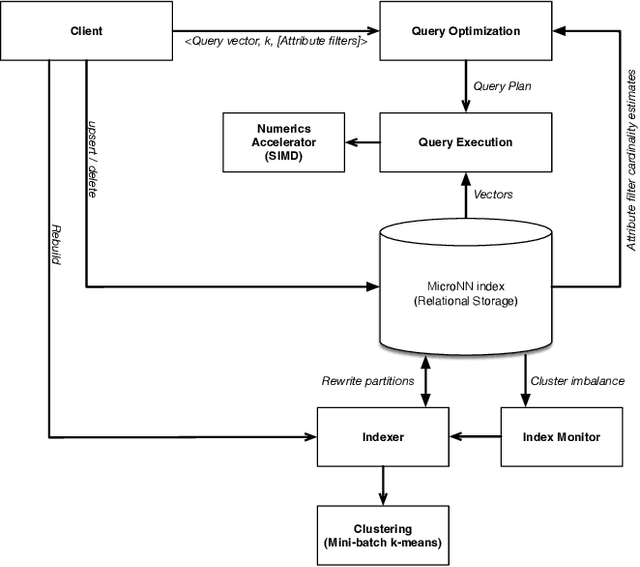
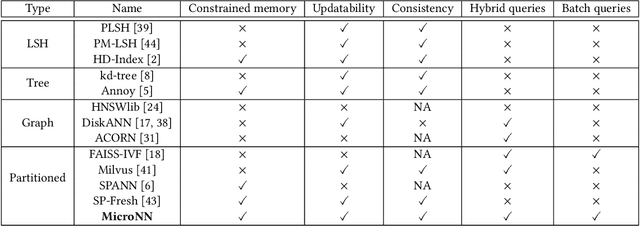

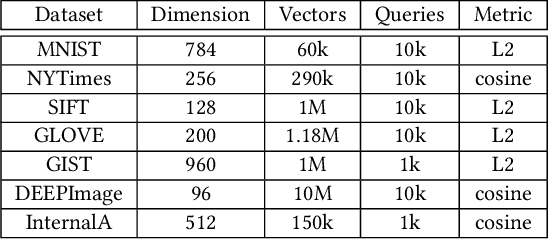
Abstract:Nearest neighbour search over dense vector collections has important applications in information retrieval, retrieval augmented generation (RAG), and content ranking. Performing efficient search over large vector collections is a well studied problem with many existing approaches and open source implementations. However, most state-of-the-art systems are generally targeted towards scenarios using large servers with an abundance of memory, static vector collections that are not updatable, and nearest neighbour search in isolation of other search criteria. We present Micro Nearest Neighbour (MicroNN), an embedded nearest-neighbour vector search engine designed for scalable similarity search in low-resource environments. MicroNN addresses the problem of on-device vector search for real-world workloads containing updates and hybrid search queries that combine nearest neighbour search with structured attribute filters. In this scenario, memory is highly constrained and disk-efficient index structures and algorithms are required, as well as support for continuous inserts and deletes. MicroNN is an embeddable library that can scale to large vector collections with minimal resources. MicroNN is used in production and powers a wide range of vector search use-cases on-device. MicroNN takes less than 7 ms to retrieve the top-100 nearest neighbours with 90% recall on publicly available million-scale vector benchmark while using ~10 MB of memory.
Growing and Serving Large Open-domain Knowledge Graphs
May 16, 2023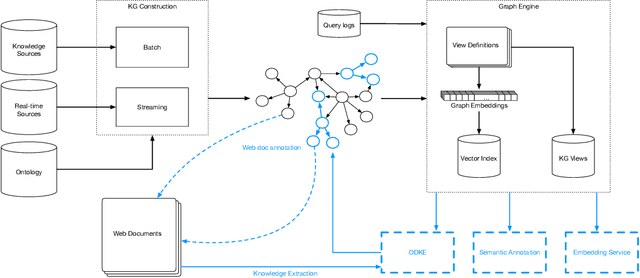
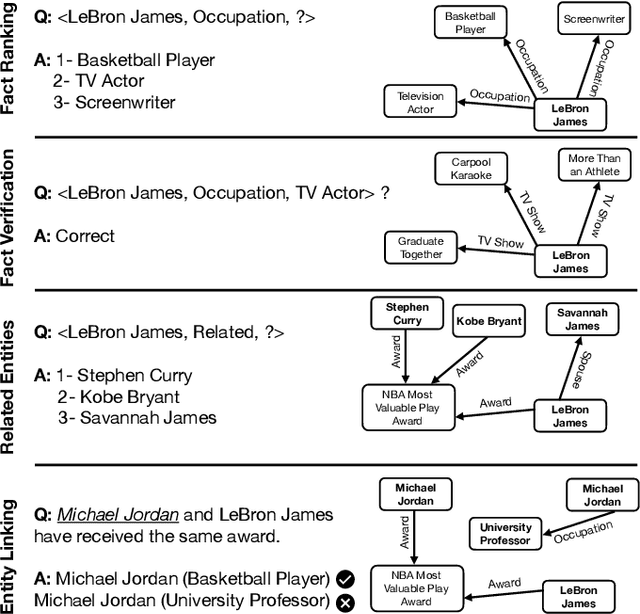
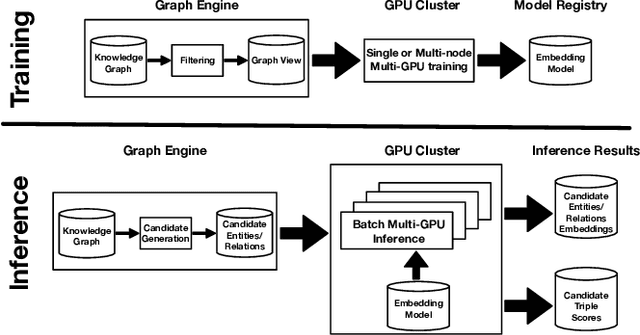
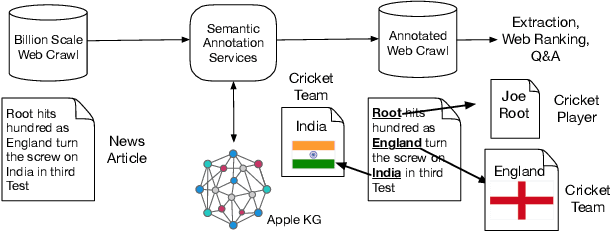
Abstract:Applications of large open-domain knowledge graphs (KGs) to real-world problems pose many unique challenges. In this paper, we present extensions to Saga our platform for continuous construction and serving of knowledge at scale. In particular, we describe a pipeline for training knowledge graph embeddings that powers key capabilities such as fact ranking, fact verification, a related entities service, and support for entity linking. We then describe how our platform, including graph embeddings, can be leveraged to create a Semantic Annotation service that links unstructured Web documents to entities in our KG. Semantic annotation of the Web effectively expands our knowledge graph with edges to open-domain Web content which can be used in various search and ranking problems. Finally, we leverage annotated Web documents to drive Open-domain Knowledge Extraction. This targeted extraction framework identifies important coverage issues in the KG, then finds relevant data sources for target entities on the Web and extracts missing information to enrich the KG. Finally, we describe adaptations to our knowledge platform needed to construct and serve private personal knowledge on-device. This includes private incremental KG construction, cross-device knowledge sync, and global knowledge enrichment.
High-Throughput Vector Similarity Search in Knowledge Graphs
Apr 04, 2023



Abstract:There is an increasing adoption of machine learning for encoding data into vectors to serve online recommendation and search use cases. As a result, recent data management systems propose augmenting query processing with online vector similarity search. In this work, we explore vector similarity search in the context of Knowledge Graphs (KGs). Motivated by the tasks of finding related KG queries and entities for past KG query workloads, we focus on hybrid vector similarity search (hybrid queries for short) where part of the query corresponds to vector similarity search and part of the query corresponds to predicates over relational attributes associated with the underlying data vectors. For example, given past KG queries for a song entity, we want to construct new queries for new song entities whose vector representations are close to the vector representation of the entity in the past KG query. But entities in a KG also have non-vector attributes such as a song associated with an artist, a genre, and a release date. Therefore, suggested entities must also satisfy query predicates over non-vector attributes beyond a vector-based similarity predicate. While these tasks are central to KGs, our contributions are generally applicable to hybrid queries. In contrast to prior works that optimize online queries, we focus on enabling efficient batch processing of past hybrid query workloads. We present our system, HQI, for high-throughput batch processing of hybrid queries. We introduce a workload-aware vector data partitioning scheme to tailor the vector index layout to the given workload and describe a multi-query optimization technique to reduce the overhead of vector similarity computations. We evaluate our methods on industrial workloads and demonstrate that HQI yields a 31x improvement in throughput for finding related KG queries compared to existing hybrid query processing approaches.
Saga: A Platform for Continuous Construction and Serving of Knowledge At Scale
Apr 15, 2022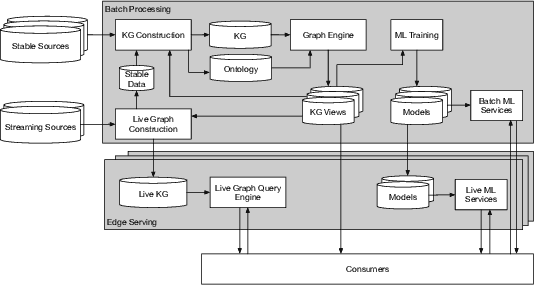

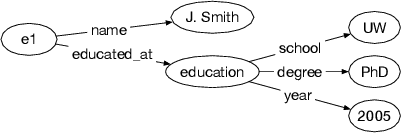

Abstract:We introduce Saga, a next-generation knowledge construction and serving platform for powering knowledge-based applications at industrial scale. Saga follows a hybrid batch-incremental design to continuously integrate billions of facts about real-world entities and construct a central knowledge graph that supports multiple production use cases with diverse requirements around data freshness, accuracy, and availability. In this paper, we discuss the unique challenges associated with knowledge graph construction at industrial scale, and review the main components of Saga and how they address these challenges. Finally, we share lessons-learned from a wide array of production use cases powered by Saga.
 Add to Chrome
Add to Chrome Add to Firefox
Add to Firefox Add to Edge
Add to Edge